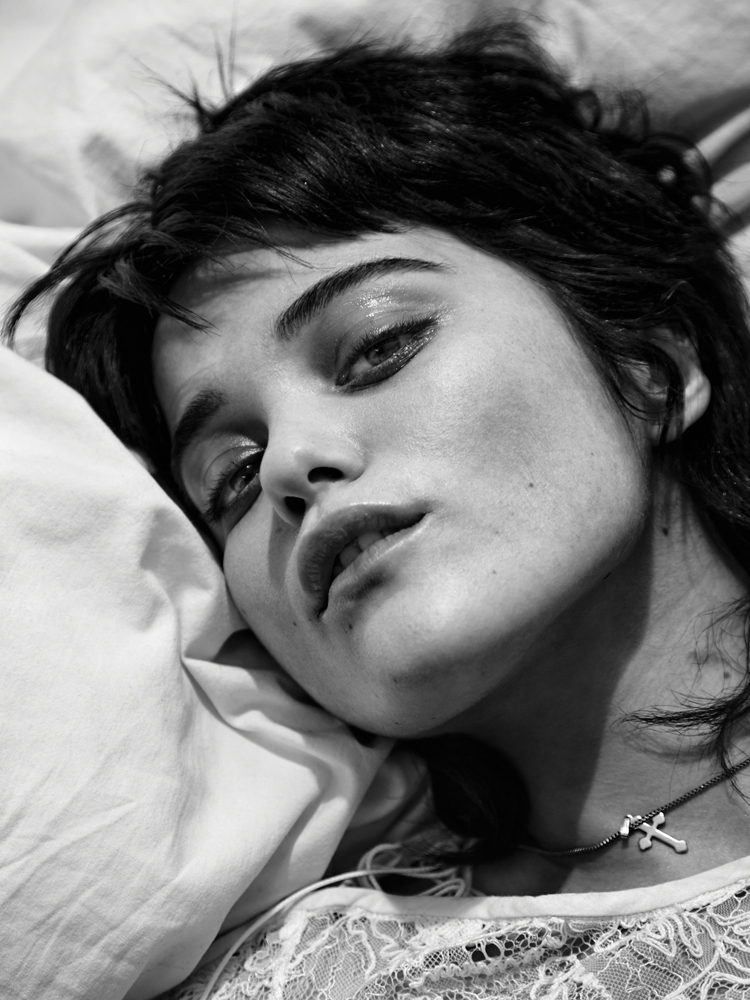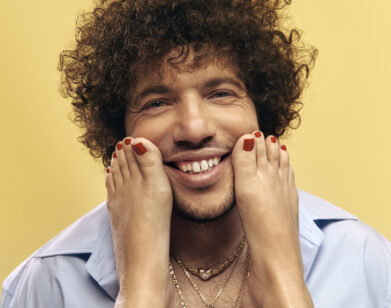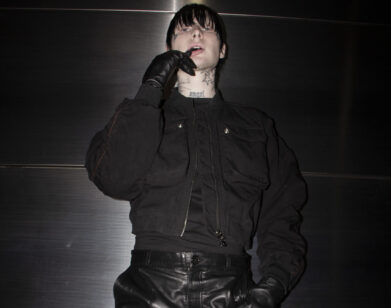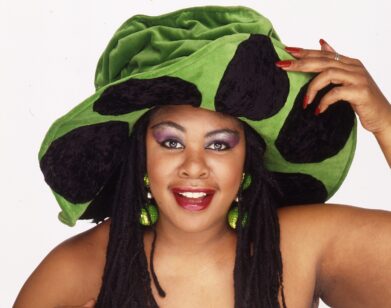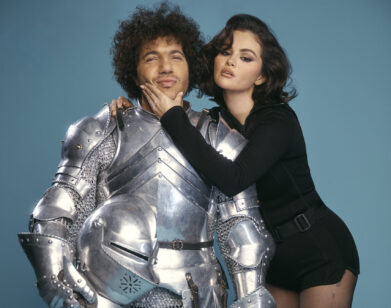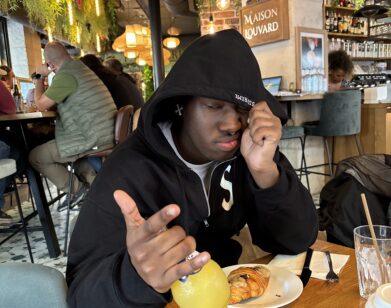Sky Ferreira
YOU’RE EITHER PRETTY AND STUPID, OR SLUTTY, OR WEIRD AND TROUBLED. I THINK PEOPLE WERE CONFUSED ABOUT WHICH I WAS. Sky Ferreira
During her unorthodox ascent, Sky Ferreira has become something of an alternate-reality pop star. One of the most compelling figures in contemporary music today, her mythology could only be birthed by our current internet age—her followers and haters alike chasing Ferreira’s every transgression, leak, and triumph via social media, her notoriety growing by the mouse click. At the same time, Ferreira, just 21, suggests an old-school, old-soul iconoclast. In her refusal to be pigeonholed, she’s become a provocative, defiantly, and sometimes messily human force in the manner of her idol, Courtney Love.
From birth, Ferreira has enjoyed a unique relationship with the spotlight. Largely raised in Venice Beach, California, by her grandmother, who worked as Michael Jackson’s hairstylist for decades, Ferreira spent a lot of time around the King of Pop. Jackson recognized her precocious talent and drive, pushing her to sing at church and study opera. At age 17, she signed a contract with Capitol Records, beginning a protracted, awkward process in which the major-label music-biz machine tried to transform Ferreira’s raw charisma into teen-idol stardom à la Britney. In response, Ferreira rebelled, releasing some of her far-edgier original material on the web herself. Then Ferreira’s song “Everything Is Embarrassing” became the left-field hit of 2012—one that pop culture couldn’t resist, much like Ferreira herself.
Despite having only released a smattering of singles and EPs, Ferreira began to shuttle between New York and Europe, morphing into a fashion muse and eventually starring in campaigns for Calvin Klein and Adidas. She used her own money from her modeling work to complete her long-delayed album, Night Time, My Time, released this past October. That debut was nearly eclipsed by events in Ferreira’s personal life. Last September, she was arrested alongside her boyfriend, Zachary Cole Smith, leader of the maverick, indie-rock band DIIV, and charged with drug possession and resisting arrest—ramping up the neo-Kurt-and-Courtney folklore growing around them. Later that year, she had to drop out of an opening slot for Vampire Weekend upon discovering a serious vocal-chord hemorrhage. But much like everything in Ferreira’s career, Night Time, My Time couldn’t be denied; it’s a rich confessional documenting the turbulence of youth, imbued with Ferreira’s unguarded, passionate voice. And now the tables have turned again for Ferreira.
I sat down with her this past February following a dynamic performance at Hollywood’s famed Amoeba Music—a warm-up for a run supporting Miley Cyrus on her massive Bangerz tour. While that might seem an unexpected pairing, Ferreira clearly thrives on such expectation—defying contradictions.
MATT DIEHL: Through the evolution of your career, you’ve evolved into something of a pop icon—and you’re just on your first full-length album. Do you feel like you make pop music?
SKY FERREIRA: I don’t know. [laughs] I don’t have a pop sensibility, but for some reason, my songs end up being poppier than expected … I wanna put, like, krautrock and Madonna and Cat Power together in some weird way. Cat Power is a very big influence on me; I relate to her in a lot of ways. You never know what you’re going to get with her, and she’s vulnerable. That’s really important. You have to sing what you mean, or what’s the point?
DIEHL: And, of course, in a few days you’re starting a tour supporting the biggest pop star of our moment, Miley Cyrus, in arenas and stadiums. What are some of the parallels between you and Miley?
FERREIRA: We’re different musically, but we’re both … You know, there’s a lot of smoke and mirrors with all this, but at the end of the day, I think we’re both very honest.
I WAS LIKE, ‘BUT WHAT WILL THEY THINK?’ THEN THIS PAST SUMMER, SOMETHING CLICKED IN ME: I WAS LIKE, ‘WHO’S THEY? THERE IS NO FUCKING THEY!’ Sky Ferreira
DIEHL: I feel like you both grew up seeing the inside of the pop machinery, and then found yourself—
FERREIRA: Through it. Exactly. I like taking risks too. The thing is, I really love and appreciate pop music, but I also wanted to make pop music that wasn’t … I’m not saying that pop music is embarrassing, because it’s not. I wanted to make something that was different, though—something that I would actually listen to, not one of those albums where you roll the car windows up and pretend you’re not listening to it, or music that makes you try to hide your iPod at the gym. Um, who actually has an iPod? [laughs]
DIEHL: I feel like you belong to this tradition of artists, spanning from Miley to, say, M.I.A., who combine what’s avant-garde and cutting edge with a very sort of “now” pop moment. Madonna really pioneered this, taking underground New York club music, reinterpreting it in her own way, and then presenting it to the mainstream, where it was unlike anything else.
FERREIRA: Madonna was always aware of what was going on. Debbie Harry, too—Debbie Harry was just cool. Really, really cool—in the way that someone like Nico was cool: so authentic and really just didn’t give a fuck at all. Like, Debbie Harry rapped. [laughs] She was one of the first girls, and definitely one of the first white women, to rap—that’s for sure. I feel that way about David Bowie, too. He’ll do weird, random things and collaborations, like sing with TV on the Radio and Arcade Fire, and you’re never like, “Aww, man—why’d you do that?” He hasn’t lost touch. Then again, he’s kind of like an alien.
DIEHL: Like David Bowie, your fans seem to identify with you and your music in a very personal, almost obsessive, way.
FERREIRA: Well, a lot of them have been coming to my shows for, like, six years. Sometimes I’ll recognize some of them, and that’s cool. They’ll come up to me and tell me, “I still have your 2007 demo from Myspace.” All that happened before the internet made everything constantly about content and not actual substance—where everyone has to be a YouTube sensation or a viral hit. Maybe I’m still stuck in the Myspace days!
DIEHL: I think a lot of that devotion stems from the fact that you’ve grown up with your fans. You’re almost 22 years old now. The whole period leading up to Night Time, My Time was like high school, and when the album was finally released, it’s like you’d graduated from college.
FERREIRA: Yeah. Woo, go college! [laughs] Before I dropped out of high school, everyone would always say, “If you don’t go to college”—and then they’d point to the crackheads on the street—”that’s going to be you.”
DIEHL: Where you grew up, in Venice Beach, there were definitely some crackheads to choose from.
FERREIRA: Yes. There definitely were. I remember I first got kicked out of school because I had tons of truancies. I just didn’t show up. I would pretend to go to school, but then I would take the bus anywhere else I could. I learned to avoid the territories in L.A. where cops would pick you up and take you back to your parents. Hollywood wasn’t one of them. If I took three buses, I could go to Amoeba and hang out all day. Before my in-store tonight, there were these kids outside who told me they’d skipped school to get here. I was like, “Ha, ha, I used to come here and do that, too!” It’s always these things that sneak up on you when you don’t expect it: as we were pulling up to Amoeba before the show, I looked up and saw my album cover on a billboard on the roof. I was like, “Whoa, to think I used to just sit at the bus stop across the street, and now I’m staring at my album cover!”
DIEHL: What did you learn on the journey making this record?
PEOPLE ASK ME, ‘DO YOU HATE YOURSELF?’ AND I’M LIKE, ‘A LITTLE BIT!’ I FEEL LIKE I’M A BIT OF A MASOCHIST. MAYBE I’M A LITTLE INTO IT. Sky Ferreira
FERREIRA: I always liked learning, and still learn every day, but I feel like I learned a lot more in life than I ever did at school. The moment I left school was kinda the moment I started actually learning. Then I ended up in a bigger version of high school …
DIEHL: The major-label system?
FERREIRA: Yeah! [laughs] All the egos and shit, the “cool kids” table, the losers, the rejects …
DIEHL: You sat at all those tables!
FERREIRA: Even at school, I wasn’t even accepted in the loser group. I was the drifter and still feel like that; people don’t know where to put me. I feel like life sometimes is just a bigger version of high school, and once I got signed, I was like, “I did all this to get into another version of that?” [laughs] I’m already insecure, but then it got so much worse. Constantly being told no, I built up this thing in my head that kind of blocked me from being able to make a proper album. I was like, “But what will they think?” or “They’re going to say no.” Then this past summer, something clicked in me: I was like, “Who’s they? There is no fucking they!” [laughs] Everyone had lost hope, but when I realized that, suddenly I was able to make most of the album in three weeks!
DIEHL: You’ve said you found the fashion world to be much less superficial than the music business.
FERREIRA: Yeah! People always give fashion people shit, but they were the first ones that actually embraced me for me. They weren’t trying to change me—whereas in music, I was constantly being told what I needed to be. The ironic part of it is, the only motive I had was that I thought that if I made an album, suddenly everyone would understand me and accept me. I’d have all the friends in the world and people would get it—whatever it is. And it kind of ended up being the complete opposite. [laughs] Nobody got it. I was constantly being labeled and pushed into being something else.
DIEHL: You’ve become a real muse to some very significant creative forces in fashion, photography, and film—people like Hedi Slimane, Gaspar Noé, Terry Richardson. However, to exist as both a muse and a strong artist, as you’ve done, proves to be a very rare occurrence.
FERREIRA: People want to write you off if you’re a muse, like you’re just the thing at the moment. That whole concept is so silly. Again, think about Madonna or Debbie Harry. Debbie Harry inspired so many people. She and Nico were muses to Andy Warhol. Kim Gordon is hardly some dumb blond lady. But that’s just how people look at it: You’re either pretty and stupid, or slutty, or weird and troubled. [laughs] I think people were confused about which I was. Whatever. I was so annoyed when I’d read that people thought I was troubled because “Oh, she got arrested.” I’m not troubled. When I made my album, I was more angry than sad. I felt more misunderstood rather than that I was having “issues.” I didn’t have issues—I was just frustrated, and making my album was the first time that I was able to actually express that. I feel like that’s why people connect with it. Someone came up to me today and told me, “I was having the worst time of my life: my parents got divorced and someone died and my boyfriend broke up with me at the exact same time. And your album got me through it, and now I’m so much better.” And I was like … [exhales] That’s why I make music.
DIEHL: I asked some of your fans in the audience tonight what questions they’d most like to have you answer. One wanted to know what was the one album that made you want to make music.
FERREIRA: I remember I was 6 years old and I saved my money and bought Tidal [1996] by Fiona Apple. I saw the “Criminal” video over and over on MTV, and it’s funny—I somehow really connected to her and listened to her for the rest of my life. That was the moment I remember making my own choice, one that wasn’t influenced by someone else. There are a lot of artists that speak to me in the way she does. Elliott Smith is one. I also remember when I discovered Hole. I knew Nirvana, and obviously Kurt Cobain was an amazing lyricist, but I remember when I first heard Hole’s Live Through This [1994]—like, really listened to it—I was like, “Oh, my god! They get me!”
DIEHL: Another fan I spoke to wanted to know what your songwriting process was.
FERREIRA: I don’t really have a songwriting process. It either happens or it doesn’t. I’ll just hear a word or see something or read something, and that’s it. But after the label shelved my album, I became really insecure. Because I was constantly told that my stuff was bad, I thought, “Maybe I am just a bad songwriter.” I found out I was overthinking things. While I was working with [producer] Jon Brion, he told me “Just write the way you actually talk and think,” and that’s what I did. He liked this one song that I thought was so dumb. The chorus was “I like you”—it was so simple, and I was like, “Wait a sec—everything I like is kind of like that, too.” That was the best songwriting lesson I ever had. It cleared my head a bit. If he hadn’t told me that, this album wouldn’t have happened. For sure.
I DON’T HAVE A FORMULA. SOMETIMES IT’S GOING TO BE HIT OR MISS, BUT YOU HAVE TO FALL ON YOUR FACE A BIT IN ORDER TO JUST KEEP GOING.YOU CAN’T MAKE EVERYONE HAPPY—THAT’S WHAT I’VE LEARNED Sky Ferreira
DIEHL: I have to admit, when I first heard songs from Night Time, My Time, like “Nobody Asked Me (If I Was Okay)” or “I Blame Myself,” I couldn’t tell if they were cries for help or a therapeutic catharsis.
FERREIRA: I feel like it’s all of those things combined. People ask me, “Do you hate yourself?” And I’m like, “A little bit!” [laughs] I feel like I’m a bit of a masochist. Maybe I’m a little into it. Maybe I get off on it. I don’t know! [laughs]
DIEHL: You’re not alone. It seems like there’s been a development in the last few years, thanks to the internet, where people follow the minutiae of someone like you or, say, Drake, getting involved in the details of your lives as if they were their own.
FERREIRA: Now there’s a record of it. I dropped out of high school when I was 15, and it’s like my yearbook is the internet. Everything I’ve done that’s embarrassing since I was 14—it’s all there. It was used against me a lot: “Oh, she’s fake. She’s bratty.” And then, when I grew into something else and tried different things, it was like, “How dare she change over time?” Just like we were saying before about David Bowie, you’ve got to be hit or miss or it’s going to get boring. Once people think they’ve figured out a formula, that’s when the music stops being good. I don’t have a formula. Sometimes it’s going to be hit or miss, but you have to fall on your face a bit in order to just keep going. Someday you’re just going to psshhh. [makes sound of head exploding] You can’t make everyone happy—that’s what I’ve learned. They’re either “I liked the older you,” or “I liked ‘Everything Is Embarrassing,’ ” or “I didn’t really care for ‘Everything Is Embarrassing.’ ” But I feel like I’ve always been the same person. When you release your first album, it’s almost like the finish line. That’s not how I want it to work. Someone asked me once, “What did you want to be when you were a little kid?” And I said, “A musician.” I always kind of knew; it wasn’t even a thought. I actually hummed before I could talk. So every time I got rejected, there wasn’t an option like, “Okay, what’s my backup plan?” I don’t believe in backup plans. I’m not a fucking showgirl. I’m not in it for the dazzle of it all. I’d rather keep falling on my face.
MATT DIEHL IS A LOS ANGELES-BASED WRITER. HE IS THE AUTHOR OF FOUR BOOKS, AND A CONTRIBUTING MUSIC EDITOR AT INTERVIEW.

